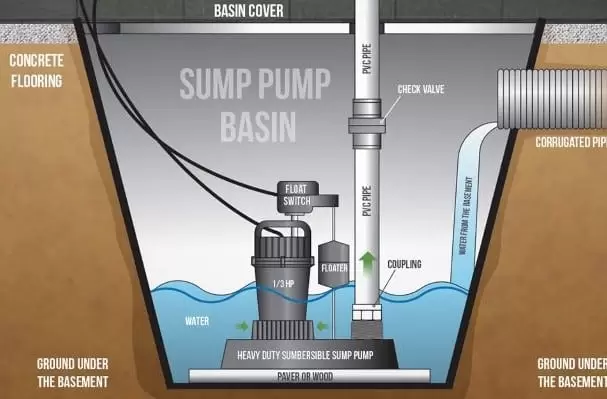Seamless Well Pump Replacement: Restoring Your Water Supply with Accuracy
Seamless Well Pump Replacement: Restoring Your Water Supply with Accuracy
Blog Article
Comprehending the Key Components of Effective Water Purification Solutions

Importance of Water Filtering Equipment
Water filtering systems play a vital role in making sure accessibility to risk-free and tidy drinking water by successfully eliminating pollutants and impurities. These systems are vital in dealing with the expanding problems over water top quality and the prospective health and wellness risks related to eating contaminated water. By utilizing numerous filtering devices such as reverse osmosis, turned on carbon, and UV sanitation, water filtration systems can effectively get rid of unsafe materials like germs, infections, heavy steels, and chemicals from the water system.
Additionally, water purification systems help to boost the preference and smell of water by getting rid of chlorine, debris, and various other pollutants that can affect its quality. Water Treatment. This enhancement in water top quality not just makes it extra palatable but likewise encourages people to drink an adequate quantity of water daily, promoting better hydration and overall health
Kinds Of Filtration Elements

Physical filters are developed to physically strain out pollutants from the water. These filters can be constructed from materials like ceramic, carbon, or even sand, and they function by capturing particles bigger than the filter's pores as water goes through.
Chemical filters utilize numerous chemical processes to eliminate impurities from the water. Instances include triggered carbon filters, which adsorb impurities, and turn around osmosis membranes, which make use of stress to separate contaminants from the water.
Organic filters make use of living microorganisms like algae or microorganisms to damage down raw material and pollutants in the water. These filters are commonly made use of in wastewater treatment plants or natural water purification systems.
Comprehending the different kinds of filtration components is important for picking one of the most Source appropriate water purification system for particular purification needs.
Feature of Sediment Filters
Sediment filters play a vital role in water purification systems by successfully capturing solid fragments suspended in the water. These filters are commonly the initial line of defense in a purification system, removing bigger bits such as sand, silt, dust, and rust prior to the water relocates with finer filtering stages. By capturing these debris, the filters avoid them from getting to downstream components, therefore extending the lifespan and performance of the whole system.
Neglecting this upkeep can lead to clogging, reduced water circulation, and endangered filtration efficiency. In general, sediment filters are indispensable elements that add substantially to the effectiveness of water filtration systems.
Duty of Turned On Carbon Filters
Playing an important duty in water filtering systems, turned on carbon filters are crucial in getting rid of contaminations and contaminants from the water supply. As water passes through the filter, the turned on carbon draws in and holds onto the impurities, ensuring that the water that comes out on the other side is cleaner and much safer for consumption.
Activated carbon filters are extremely efficient at boosting the taste and odor of water by decreasing chemicals that can affect its high quality. Due to their flexibility and reliability, turned on carbon filters are a key element in guaranteeing that water is purified to the highest criteria prior to getting like it to customers.
Comprehending Reverse Osmosis Systems
Reverse osmosis systems are innovative water purification systems that use an innovative procedure to get rid of impurities and impurities from drinking water. These systems function by applying stress to the water, requiring it through a semi-permeable membrane.
One trick benefit of reverse osmosis systems is their ability to get weblink rid of a wide variety of pollutants, including heavy metals, dissolved infections, germs, and solids. This makes them extremely effective in enhancing the general top quality and safety of alcohol consumption water. Additionally, reverse osmosis systems are fairly low-maintenance and can be set up under the sink or in a central filtering system, providing convenient accessibility to clean water throughout the house. On the whole, understanding exactly how reverse osmosis systems work can help people make informed decisions regarding their water purification requirements.
Verdict
In verdict, efficient water filtering systems are important for guaranteeing secure and tidy alcohol consumption water. The essential components of these systems include sediment filters, turned on carbon filters, and turn around osmosis systems. By comprehending the feature and function of each element, individuals can make educated decisions when choosing a water filtration system. It is very important to focus on the high quality of water in order to advertise overall wellness and health.
Water purification systems play a critical role in ensuring accessibility to risk-free and clean alcohol consumption water by successfully eliminating contaminants and contaminations. By utilizing numerous purification systems such as reverse osmosis, triggered carbon, and UV sterilization, water filtration systems can successfully remove hazardous materials like bacteria, viruses, hefty metals, and chemicals from the water supply.
Debris filters play a critical function in water filtering systems by properly recording solid particles suspended in the water (Water Filtration Systems).Playing a vital role in water purification systems, triggered carbon filters are instrumental in getting rid of contaminations and contaminants from the water supply.Reverse osmosis systems are advanced water filtering systems that employ an innovative procedure to remove contaminants and contaminations from drinking water
Report this page